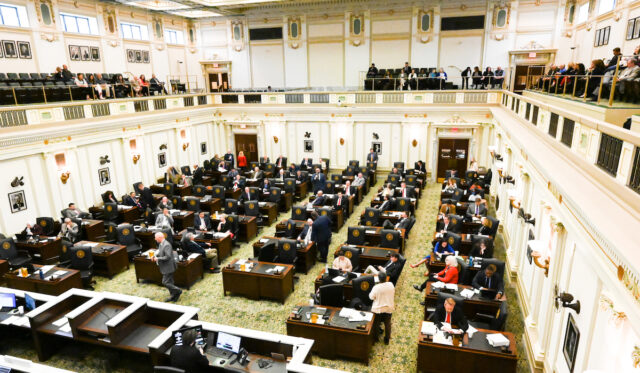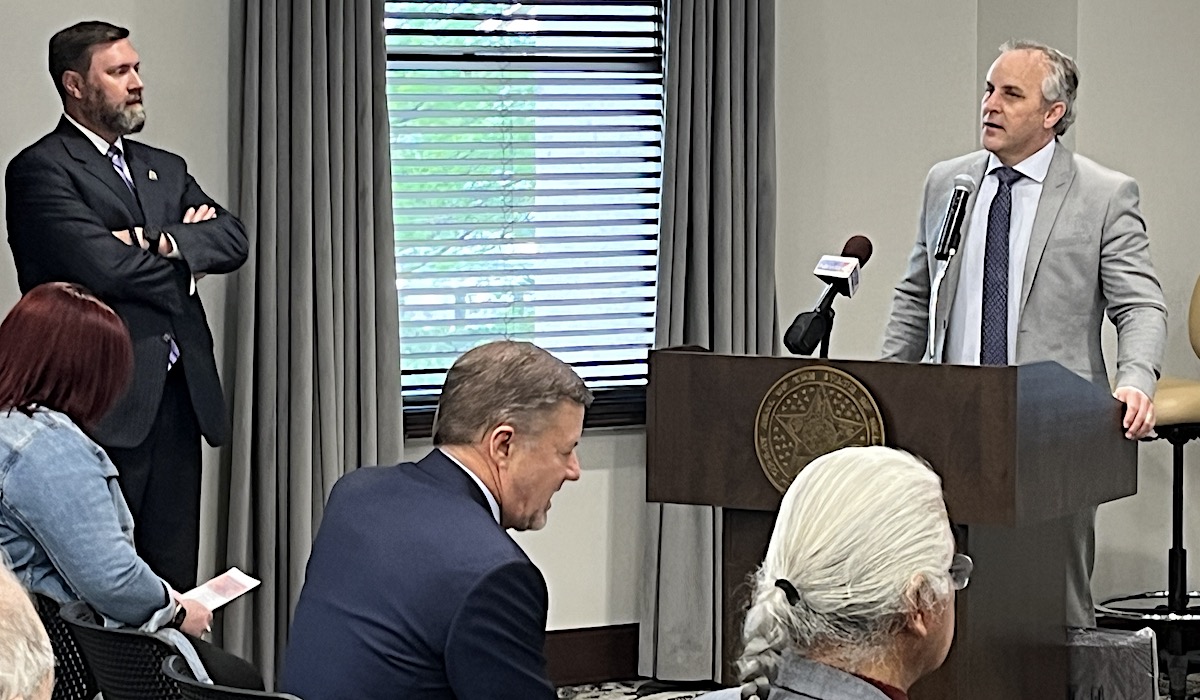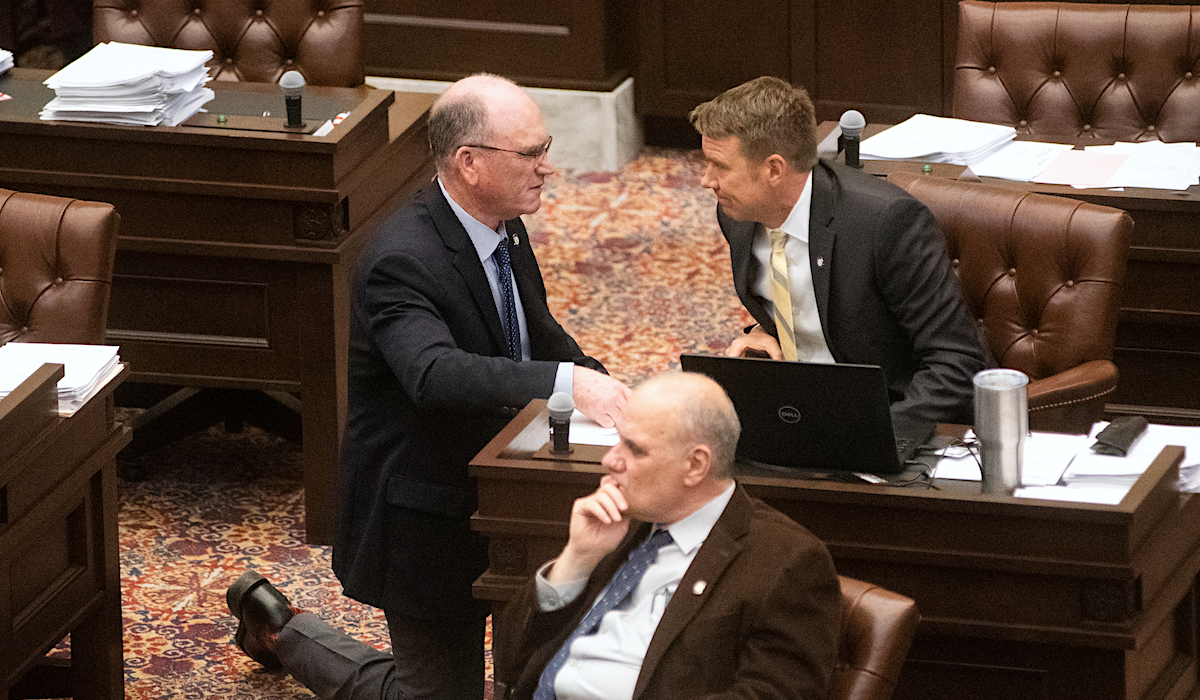

With a Tuesday-morning meeting between Gov. Kevin Stitt and legislative leaders reportedly making little headway in the House and Senate dispute over a massive education funding and school choice reform package, House Republicans used the convoluted conference committee process Wednesday to advance a “compromise” proposal pitched by Stitt days prior.
“It’s now the Senate’s turn to decide. They can vote it through, they can reject it, or they can do nothing,” said House Majority Floor Leader Jon Echols (R-OKC) after the House acted on HB 2775, HB 1935 and SB 561. “They can decide whether they want to do the governor’s education plan or not, but this is the second education plan that the House has sent over, and we look forward to the Senate taking a look.”
Senate President Pro Tempore Greg Treat took a look and said it was the same unsatisfactory picture he had peeped Friday at Stitt’s show.
“We have already communicated to the House and governor that this isn’t going to pass in the Senate,” said Treat (R-OKC). “They are playing games and giving false hope.”
Senate Appropriations and Budget Chairman Roger Thompson offered a similar appraisal.
“I think they are still continuing the political games,” said Thompson (R-Okemah). “I am still waiting for them to get out and do good policy discussion.”
Thompson, however, has not been in the bicameral negotiations over education funding and school choice tax credits. Instead, Treat has relied on members like Senate Education Committee Chairman Adam Pugh (R-Edmond) to be in the room for those talks.
Asked his reaction to the House advancing Stitt’s version of the education package — which proposes a staggered teacher pay raise between $2,000 and $5,000 instead of Pugh’s preferred $3,000 to $6,000 range — Pugh told NonDoc he had nothing to say.
Rep. Mark McBride, chairman of the House Appropriations and Budget Common Education Subcommittee, said Pugh has been similarly mute with him over the past month.
“My Senate counterpart has literally nothing to talk to me about. One meeting we had, he said he was going to hold everybody flat. No line items. He wasn’t willing to do anything,” said McBride (R-Moore). “So I don’t know. It’s not like it has been in the past. In the past, my Senate counterpart and I would talk. We would meet once every one or two weeks, and we would negotiate back and forth, and what we decided went up the chain to the full appropriations chairmen — Thompson and Wallace. And that was the education budget.”
House Appropriations and Budget Chairman Kevin Wallace (R-Wellston) said last week and again Monday that “this is probably one of the worst sessions that I have been in.”
In their versions advanced by the House on Wednesday, HB 2775 would dedicate $600 million in new funding to Oklahoma public schools, HB 1935 would create new refundable tax credits for the families of homeschool and private school students, and SB 561 would increase teacher pay on a stair-step plan between $2,000 and $5,000, based on longevity.
“It seems to me that the House has made many concessions and has been willing to negotiate on many parts of the education plan excluding one, which is the Oklahoma Student Fund, and it doesn’t seem like that is being reciprocated from the other chamber,” Wallace said April 20.
Treat calls House requirement ‘very objectionable to my caucus’

Demanded by the House and opposed by the Senate, the Oklahoma Student Fund refers to a proposed $300 million pot of new appropriations for public school districts that would have few guidelines governing its use. Districts could pump the money into teacher salaries, support services or various programs, but the version of HB 2775 proposed by the governor and advanced by the House today would cap those funds at no more than $2 million per district.
Senate leaders have voiced opposition to that cap, which would break away from the state’s per-pupil funding equalization formula to the benefit of rural school districts and the detriment of urban and suburban areas.
“The ‘Student Fund’ is very objectionable to my caucus,” said Treat, who represents multiple urban school districts in northwest Oklahoma City and southwest Edmond.
Echols, who represents districts on the far southwest city of OKC, took umbrage with objections to the House’s proposal.
“We’re talking about a $3.7 billion education budget if this passes — the largest education budget in this history of the state of Oklahoma, by a lot,” Echols said. “The Oklahoma Student Fund is only $300 million of that. Only about $150 million of that would be given in any way different than the formula. So we are talking about in comparison to the total education budget about 4 percent. So we’re talking about saying ‘No’ to the largest increase in the history of the state of Oklahoma (…) because we have a disagreement over where 4 percent of the total education budget goes? I think it shows everything that is wrong with politics.”
Echols said he heard from an OKC-area superintendent who opposed the House’s effort because the Oklahoma Student Fund would disproportionately support rural school districts.
“I have three children. That’s how they think,” Echols said. “It is the thing that is most important to the House because that’s where the majority of the House Republican Caucus is — they want the Oklahoma Student Fund. The benefit of it is the additional funding to rural schools. It’s not complicated. It’s not a secret.”
Underscoring the burgeoning tensions in the building, Echols’ explanation edged toward exasperation.
“How do I justify giving my urban schools more money but not giving them (as much as rural schools)? I tell them don’t be a child. That argument to me is just beyond ridiculous. We know this is the formula that unlocks all the extra money,” Echols said. “What’s interesting is I’ve never had a kindergartener say ‘No’ to a donut because somebody else gets two donuts. The reality is, that’s what this is about. We bring in rural members, urban members and suburban members. And frankly, as an urban member, I think we’re beyond pejorative when we pat the rural members on the head like they don’t understand what they are asking. They’re very clear in what they are asking for. They are asking for something to make up for the vast differences inside the amount of money they get in property taxes, the vast money differences they get inside community support, the vast money differences that they get from booster clubs.”
Asked about Echols’ implication that those concerned about the Student Fund’s cap are being childish, Treat paused before saying he would “refrain” from firing back.
Thompson, however, said everyone should have access to the proverbial donuts.
“I think we need to treat all children the same,” Thompson said. “I think we’ve got to get the education deal finished so we can do the rest of the budget.”
‘It’s a little confusing as a freshman’

Despite the House’s criticism that the Senate is not willing to negotiate, other Republican senators said they would like to see a deal struck.
Freshman Sen. Jerry Alvord (R-Ardmore) has generally attempted to listen more than talk during his first legislative session, but asked Wednesday about the heated House rhetoric and the staunch Senate stalemate, the former Carter County commissioner waded into the fray.
“I look at this whole education thing as a positive. It’s a plus. Everybody is going to get something out of this,” Alvord said. “The difference between the House and the Senate is who gets what, and I don’t see the differences being so hugely vast that we can’t come to a middle ground. However, you’ve got to draw a line somewhere, so that is kind of what is happening.
“It’s a little confusing as a freshman why we can’t find some middle ground, but I understand both sides, so we will see what happens.”
Sporting one of his trademark hats and a bright orange sportcoat, Sen. Blake Stephens wore his frustration on his face as he debated whether to offer an opinion on the education negotiations. Eventually, the senator called “Cowboy” saddled up and said what was on his mind.
“Where I’m at is I’m trying to get teachers as much money as I can for a teacher pay raise,” said Stephens (R-Tahlequah). “A $2,000 pay raise is not even — to me, that’s a cold slap in the face.”
Stephens, a former school counselor known for giving turkey feathers to students to lift their spirits, said the Legislature needs to make a more substantial investment in retaining and attracting educators.
“It’s not just because teachers deserve it. It’s because it’s the right thing to do. They do deserve it, but we’ve got to value our teachers. They are leaving by the trainloads,” Stephens said. “We can’t continue year after year to do this.”
Like Alvord, Stephens said he is not willing to waive the white flag on the contentious education package discussions.
“I 100 percent believe we can get a deal done,” Stephens said. “It’s not over until it’s over.”
Back in the House, McBride and Echols agreed.
“Being willing to walk away from it, I don’t think that would be a very good answer to anything,” McBride said. “I just want to see something get done. I’ll leave it there. It’s time to get something done. I’m going to be nice. I might be ugly later, but we’ve got to get a deal.”
Echols said lawmakers trying to “be as pure as we want” will not help students.
“I’m not going to let the perfect be the enemy of the good. The argument is getting to the point of the offensive. We know what the arguments are,” Echols said. “There is one side that said, ‘I’ll bend. I’ll come up with something that helps fund all kids.’ The other said says, ‘I’ll have nothing but my way and forget about kids.’ I’m never going to be on that side, and I’m going to call out that side as much as I can.”




















